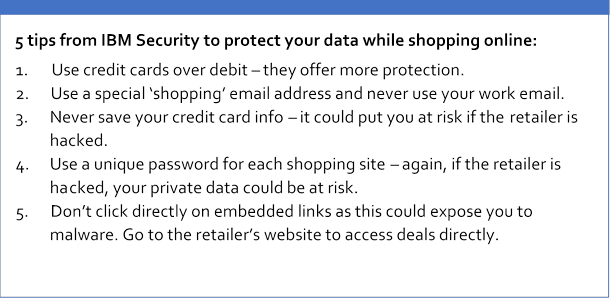
Canadians ‘defeatist’ about security of private data: IBM
By CS Staff
News Data Security cyber attacks cyber security data data security E-commerce holiday shopping IBMMARKHAM, Ont. — According to findings from an IBM Canada data ownership and privacy survey, 83 per cent of Canadians feel businesses should be doing more to protect consumers against cybersecurity threats where their personal information could be stolen; yet, 65 per cent feel it is unrealistic to expect their personal information to be secure, and 71 per cent feel it is impossible to live and work using modern technology without giving up the privacy of their personal data.
When asked who holds their personal information, 73 per cent of Canadians admitted they don’t know.
Trust — or lack of — consistent across industries
When asked which organizations they trust most with the security and privacy of their personal information when it comes to actions such as storing, sharing, and selling, IBM says Canadians don’t see much of a difference. Across six categories of business, ranging from health care organizations to social media platforms, results show that trust levels are consistent, mostly within a 5 per cent range. Canadians appear to hold the same levels of trust in ride-sharing apps as they do with banks.
“We are moving into what is known as a ‘trust economy’,” said Ayman Antoun, president of IBM Canada, in a prepared statement. “Canadians are becoming more aware of which businesses are placing a higher priority on the privacy and security of personal information.”
Only 19 per cent of respondents said they fully trust organizations to keep their personal information secure and not share it without permission. IBM says results also show that how a business handles personal information is starting to impact buying decisions.
Cyber security fears affecting how Canadians spend their money
One-third of Canadians say they or someone they know has been cyber-hacked and 25 per cent admit they don’t actually know if they’ve had their personal data hacked or stolen; IBM says this is making holiday shoppers more wary.
The survey found that, consistently across all age groups, 55 per cent of Canadians are more concerned this year than last about their personal information being compromised while holiday shopping online. 52 per cent are so concerned about the privacy of their personal information that they are more hesitant to shop online this holiday season.
“Cybercriminals are always looking for ways to take advantage of online consumers and so it is critical for businesses to have security in place that can stay ahead of them to eliminate vulnerabilities or risks,” said Ray Boisvert, an associate partner with IBM Canada Security Services, also in a statement. “But Canadians also need to stay vigilant and do what they can to keep their data safe. Doing business with a company they trust is a good start.”

Shopping tips from IBM
A generational divide?
IBM says different generations of Canadians have varying views on the privacy of their personal information. As age increases, Canadians become more concerned about how their data is used. 57 per cent of Gen Zers and early Millennials (ages 18 to 29) are fine with companies sharing their information if they tell them about it in advance, while only 44 per cent of Gen Xers (ages 30 to 49) and Baby Boomers (50 and older) feel the same way.
Another differentiator between the generations is that 30 per cent of the Gen Z/early Millennial group is fine with businesses sharing their personal information without telling them, and 29 per cent feel ok with their data being sold to other companies. 55 per cent approve of their information being used to develop and improve technologies.
IBM notes baby boomers are significantly less amenable to losing control of their data — 17 per cent do not want their data shared without their knowledge, and only 13 per cent said they are open to their data being sold. They are also 10 per cent more likely than younger generations to read the fine print to understand how their data could be used, and 10 per cent less likely to buy from a business again — no matter how great their products are — if they share their information without permission.
Print this page
Advertisement
- Private aviation firm launches personal protection division
- City of Hamilton warns of possible privacy breach involving water services
Leave a Reply